|
Why am I passionate about mental health? You could say that it's in my DNA…. My mom is a licensed Marriage Family Therapist and my dad was a professional musician. I grew up with a keen interest in people and artistry in all forms that seeks to express the human experience. I earned college degrees in both music and psychology. I've continually balanced these two aspects of my personal heritage throughout my life, informed by my own pursuit of a creative career as well as those around me. Of course, part of my passion stems from my own experience as a professional singer. I’ve personally experienced the challenges of being a creative in a highly competitive field: the ups and downs of gigging, dealing with rejection, navigating my own perfectionism, and managing my own expectations of what a career in the arts looks like… all while trying to protect the spark of creative expression alive in me. I've discussed losing that spark of joy and the journey to reclaim it. I’ve also seen my loved ones challenged. My father was a professional musician and educator– both successful and respected in his own right. He was a private man and kept his physical, mental, and financial struggles a secret from everyone, including those of us within his family. We only found out about the physical illness that led to his passing when it was at Stage 5, much too late to do anything except keep him comfortable. In dealing with my father’s death and financial affairs, I learned a poignant lesson that the stigma of asking for help (of any kind) still exists and we must pay better attention. That experience further fueled my desire to support a greater quality of life and working conditions for creatives. I’m deeply passionate about mental health in the creative industries, and have actively promoted it in my community:
Like I said in a previous blog article, navigating a creative career can be quite emotional, yet there is little to no training on healthy emotional resilience. We’re often told the industry is hard and unfair, necessitating “thick skin,” which often leads to unhealthy coping mechanisms and outcomes. However, this issue is not solely attributed to personal training, fortitude, or persistence (in other words, this is not a personal failing of creatives). Research is beginning to show significant systemic challenges with the industry that impact musicians' mental health:
More frequently, I’m hearing stories and reading articles about artists not making any money on tour or taking a loss. Inflation has been one major reason, but also the long standing industry practice of paying everyone else before the artist. I have witnessed this firsthand from when I was VP of Operations for a performing arts booking agency and did tour budgeting and reconciliation, before the pandemic. Since 2020, it’s become even more challenging to undertake a financially viable tour. Not only is this frustrating for all involved, but it can take a toll on one’s mental health and family relationships. At the Music Policy Forum in Boise this past December (2023), one of the most powerful messages I took away from the whole conference came from Aaron Myers – musician and Executive Director, Washington DC Commission on Arts and Humanities. He powerfully described the incredible emotional high of performing for thousands of cheering fans connecting with our shared humanity, then coming back home to a silent apartment and maybe still being broke. Watch Aaron’s clip here describing the artist experience. It’s no wonder that artists’ mental health is suffering when you seemingly achieve your career goals, yet the reality is very different from what you expected. Backline.care, a nonprofit that connects music industry professionals and their families with mental health and wellness resources, shares shocking statistics as well:
All of this speaks to the ongoing need for advocacy for creatives and creative businesses – supporting greater funding, access to health care (including mental health care), reducing the stigma around mental health by continuing to normalize it, and sharing the resources that are already available (often free or low-cost), such as the free support groups with Backline, MusiCares, and the Music Industry Therapist Collective. It’s okay not to be okay. Know the signs (see infographic below). Seek out support. Your mental health is important. During this Mental Health Awareness Month, check in with yourself and your loved ones, too! Anxiety/Depression graphic credit: thewrightinitiative.com
|
AuthorCheri Jamison is an Arts Consultant with over 13 years of experience in arts and nonprofit management. Cheri Jamison Consulting LLC focuses on strengthening organizations through capacity-building, executive coaching, board training, and professional development. www.CheriJamison.com Categories
All
|


 RSS Feed
RSS Feed